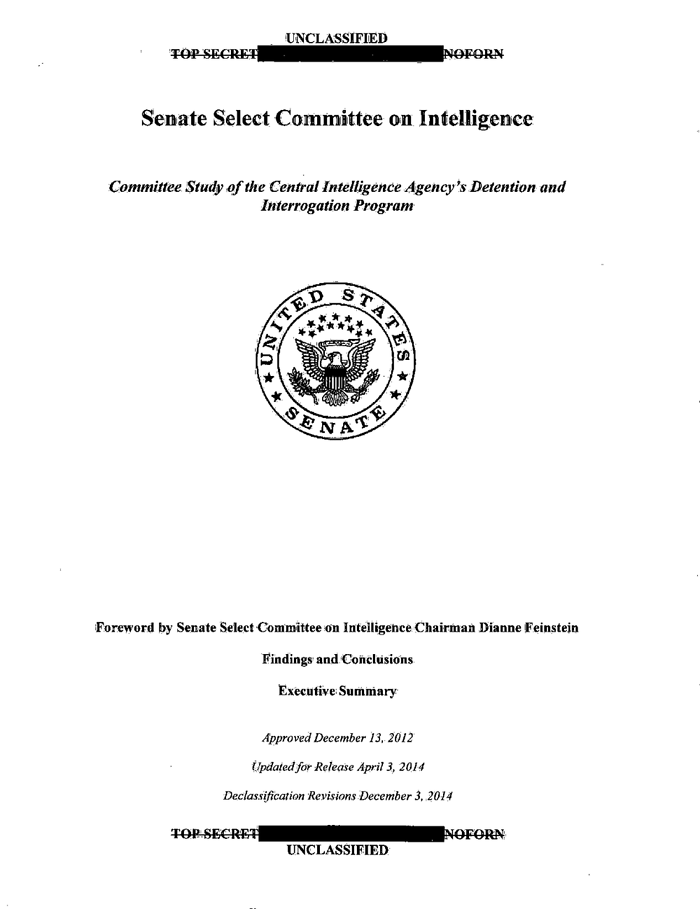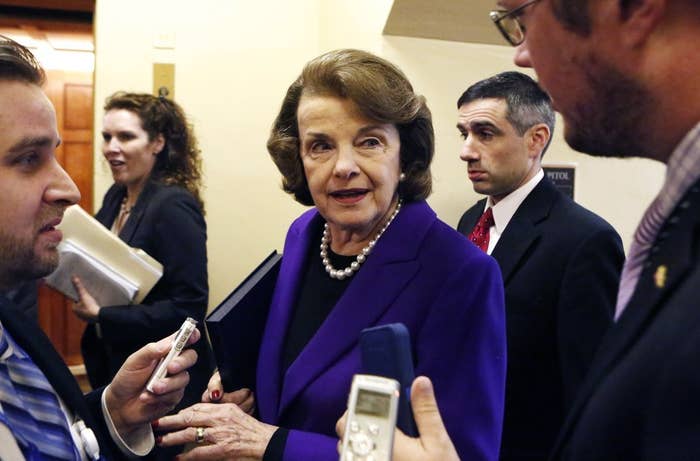
What We Know So Far
- Senate Intelligence Committee releases 525-page report on CIA interrogation and detention activities.
- Obama: "I hope that today's report can help us leave these techniques where they belong — in the past."
- Committee Chair Sen. Dianne Feinstein said releasing the report is "an important step to restoring our values."
- Senator McCain broke with his Republican colleagues on the torture report, saying on the Senate Floor that CIA activities "stained our national honor."
- The CIA once used enhanced interrogation tactics by mistake on two of its own informants.
- Read the full report.
Updates
U.S. officials issue terror warning, citing potential backlash to report on CIA interrogations.
The FBI and Department of Homeland Security issued a terror warning in response to possible backlash generated by a Senate report detailing the CIA's use of enhanced interrogation techniques after 9/11.
The bulletin cites no specific threats, but warns that the release of the report "could prompt anti-U.S. protests and violence against U.S. interests, including private U.S. citizens," CBS News reported.
The agencies also reminded law enforcement officials to remain vigilant against the underlying threat from terrorist organizations and those acting alone.
The U.S. embassies in Afghanistan and Thailand — which played host to two secret facilities where prisoners underwent harsh interrogation techniques — were also warned of the potential for anti-American demonstrations and violence.
U.S. officials, including President Obama and Republican Sen. John McCain, acknowledged Tuesday that the release of the report could inflame anti-American sentiment abroad.
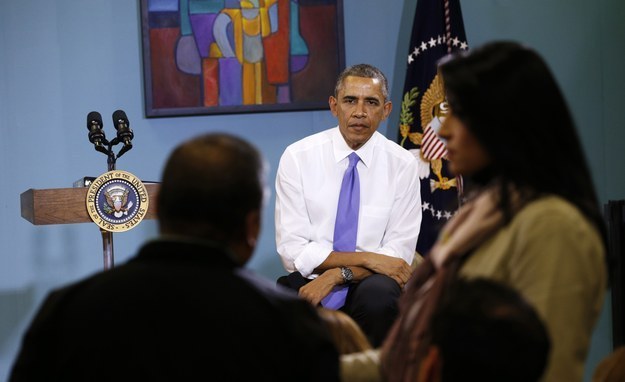
President Obama says "brutal" CIA tactics were overzealous response to 9/11.
President Obama on Tuesday addressed the Senate report that details what he called sometimes "brutal" interrogation techniques, and acknowledged that the revelations could put Americans overseas at risk.
In an interview with Telemundo, which was partially carried by sister network NBC, the president said the now-banned enhanced interrogation tactics were the result of an overzealous agency rushing to respond to the terrorist attacks of 9/11.
"In the aftermath of 9/11, I think in the midst of a national trauma and uncertainty as to whether these attacks were going to repeat themselves, what's clear is that the CIA set up something very fast, without a lot of forethought to what the ramifications might be, that the lines of accountability that needed to be set up weren't always in place," Obama said.
He also said that the U.S. needs to put safeguards in place to prevent the same sort of things from happening again, even in the heat of responding to a potential national security threat.
"Heaven forbid, we find ourselves under the types of threats that have occurred in the past, that we recognize the dangers ahead of time and do better," he said.
Republicans have criticized the findings of the Senate Intelligence Committee report as being incomplete, and have argued that releasing the report could unnecessarily inflame tensions around the globe.
However, Sen. John McCain, a Republican from Arizona and former prisoner of war, said the report's findings were a "stain on our national honor."
Also addressing the potential fallout, McCain said the truth "sometimes causes us difficulties at home and abroad."
Interrogators threatened to sexually abuse detainee's mother in front of him.
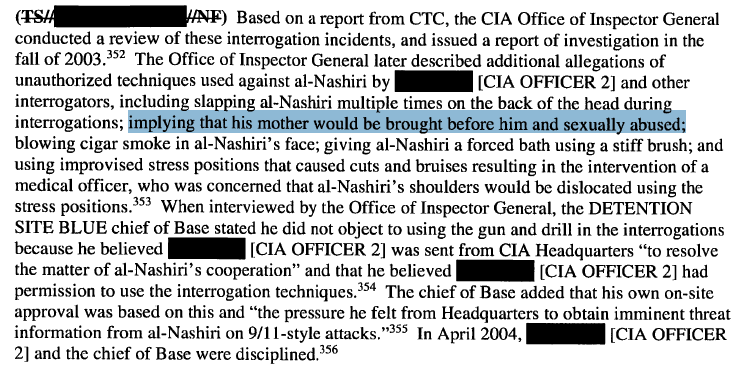
Torture did not lead to Bin Laden.

The administration is staying away from the "did torture work" debate.
The White House will not referee between Senate Democrats who say CIA torture didn't work and CIA officials who said interrogation techniques now banned "saved lives."
"We are not going to engage in this debate," a senior administration official told reporters on a conference call Tuesday. "I think that would miss the overriding point that the president made clear, which is that some of these techniques are contrary to our values and were overall detrimental to our security given, among other things, the response overseas to the fact that the United States is engaged in these techniques. And that is why, of course, why the president prohibited these interrogation techniques as one of his first acts in office."
In his official response to the the Senate Intelligence Committee report Tuesday, CIA Director William Brennan said, "Our review indicates that interrogations of detainees on whom EITs were used did produce intelligence that helped thwart attack plans, capture terrorists, and save lives," referring to the CIA's acronym for enhanced interrogation techniques. Senate opponents of enhanced interrogation have said their investigation proved torture did not work in regards to producing worthwhile intelligence.
The administration official said Obama has "complete confidence" in Brennan, but said the debate was a hypothetical one, requiring "counterfactual" examples of other techniques producing the same intelligence that don't exist.
"We cannot know what the outcome of that counterfactual is. We cannot know what other interrogation techniques may have fielded," the official said. "So for us the reason for prohibiting the techniques is that they're contrary to our values. We do believe that there are interrogation methods that can get invaluable intelligence. We use those every day in terms of when we need to interrogate terrorism suspects."
Former CIA Chief denies he lied to Congress as detailed in the torture report.
Speaking with NewsMaxTV's Steve Malzberg Show, former CIA and NSA chief Michael Hayden denied he lied to Congress during his 2007 testimony on Capitol Hill.
Nearly 40 pages of the Senate Democrat's torture report are spent fact-checking then-CIA Chief Michael Hayden's one-day testimony.
Here's the transcript of the interview:
NewsMaxTV: General, did you lie to the Committee in 2006 — I believe September of 2006 — the entire Committee, when you spoke to them?Hayden: No, would be the straightforward and simple answer.
NewsMaxTV: Did you ever lie to that Committee?
Hayden: No, of course not. Look — first of all, it's a felony. A couple other points to be made, Steve, alright? That briefing took place because Mike Hayden and the Agency wanted it to take place. This was our work, in the summer of 2006, to convince the Administration that we had to brief the entire Committee on the entire detention and interrogation program. And so I ask you — I'm fighting with the administration, CIA's in the adminstration, to get an audience to Congress so we can lie to them? I'm, you know …
NewsMaxTV: So when Dianne Feinstein today says you lied, is she lying?
Hayden: Uh, I'll go so far as to say she's incorrect. I mean, lying is intentionally misleading someone, alright? Let me make another distinction: telling people something they don't want to hear is not the same thing as telling people something that is untrue.
Here's the video of the exchange:
After a brief break, the CIA restarted its "enhanced interrogation" after determining that the Military Commissions Act allowed it after all.
In 2006, the Supreme Court ruled in the case Hamdan v. Rumsfeld that the military tribunals was inconsistent with the Geneva Conventions. "The implication of the decision was that treating a detainee in a manner inconsistent with the requirements of [the Geneva Convention] would constitute a violation of federal criminal law."
According to the report, "CIA attorneys analyzed the Hamdan decision, noting that it could have a significant impact on 'current CIA interrogation practices.'" The decision also led the CIA to be concerned that enhanced interrogation could be "construed as inconsistent with the provisions of Common Article 3 prohibiting 'outrages upon personal dignity' and violence to life and person."
The Military Commissions Act (MCA) was passed in 2006 and was intended to be a way to authorize the use of military tribunals. The CIA also interpreted the law as allowing them to resume the use of enhanced interrogation techniques in 2007. The ACLU worried at the time that would be the case, but the Bush administration insisted that the law did not allow torture.
Sen. Feinstein says report will "stand the test of time."
"Obviously I know what's in the report and it's very heavy stuff. Nobody wants to do something that's going to bring on any kind of attack but I also came to the conclusion that America's greatness is being able to say we've made a mistake, we're going to correct it and go on from there."
"The face that everything in it is a record, it's contemporaneous to what's going on. There's no rationalization 12 years later, no reinvention of history, it's all what happened when it happened. It's going to stand the test of time. I anticipated I would have some very hard days but so be it."
Report claims no CIA officer briefed President Bush on the program until April of 2006.

Senator McCain breaks with colleagues on torture report, CIA activities "stained our national honor."
The Republican Arizona senator who himself was a former prisoner of war during the Vietnam War praised the release of the report in a speech on the Senate floor Tuesday.
"I commend Chairman Feinstein and her staff for their diligence in seeking a truthful accounting of policies I hope we will never resort to again. I thank them for persevering against persistent opposition from many members of the intelligence community, from officials in two administrations, and from some of our colleagues. The truth is sometimes a hard pill to swallow. It sometimes causes us difficulties at home and abroad. It is sometimes used by our enemies in attempts to hurt us. But the American people are entitled to it, nonetheless. "They must know when the values that define our nation are intentionally disregarded by our security policies, even those policies that are conducted in secret. They must be able to make informed judgments about whether those policies and the personnel who supported them were justified in compromising our values; whether they served a greater good; or whether, as I believe, they stained our national honor, did much harm and little practical good."
Video of the speech is below and the entire speech can be read here.
We, as former senior officers of the Central Intelligence Agency, created this website to present documents that conclusively demonstrate that the program was: authorized by the President, overseen by the National Security Council, and deemed legal by the Attorney General of the United States on multiple occasions. None of those officials were interviewed either. None. CIA relied on their policy and legal judgments. We deceived no one. You will not find this truth in the Majority Report.
The CIA once used enhanced interrogation tactics by mistake on two of its own informants.

Report finds that of the 39 detainees submitted to enhanced interrogation, nearly 20 percent produced no intelligence reports.
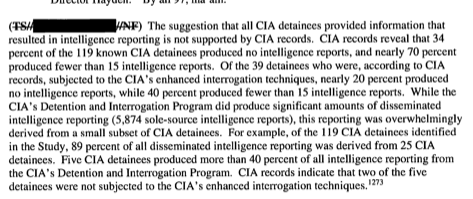
At least a fifth of CIA detainees were wrongfully held, including an "intellectually challenged" man, report claims.

The CIA didn't file crime reports when certain classified info was published by the press -- because they leaked it to shape message, report finds.
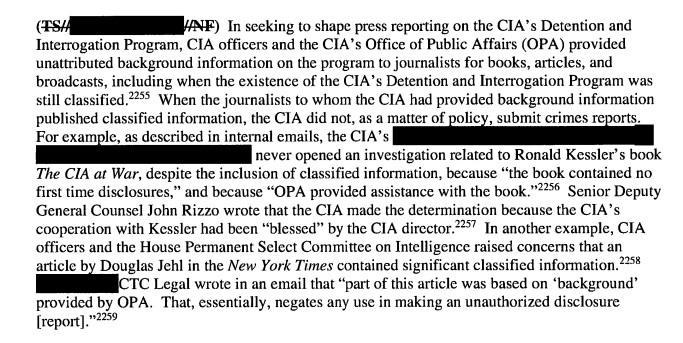
CIA officials involved in the interrogation program had “histories of violence” including “sexual assault.”
According to the Senate investigation, the CIA did not properly vet officials participating in the interrogation program, despite claims by then-CIA Director Michael Hayden that they were "carefully chosen and screened."
Some of those officials had "serious documented personal and professional problems, including "histories of violence" and "abusive" behavior. Some had "reportedly admitted to sexual assault." Those records "should have called into question their suitability to participate in the CIA's Detention and Interrogation Program, their employment with the CIA, and their continued access to classified information."
Yet "in nearly all cases," the report concludes, "these problems were known to the CIA prior to the assignment of these officers to detention and interrogation positions."
CIA officials participating in the program also did not necessarily have relevant expertise. According to the report, "The CIA placed individuals with no applicable experience or training in senior detention and interrogation roles, and provided inadequate linguistic and analytical support to conduct effective questioning of CIA detainees, resulting in diminished intelligence."
Report finds CIA forced detainees with leg injuries into stress positions.

Emails reviewed by the committee showed CIA destroyed videotapes of interrogations in direct response to the possibility of passage of an independent commission to investigate U.S. detention policies.
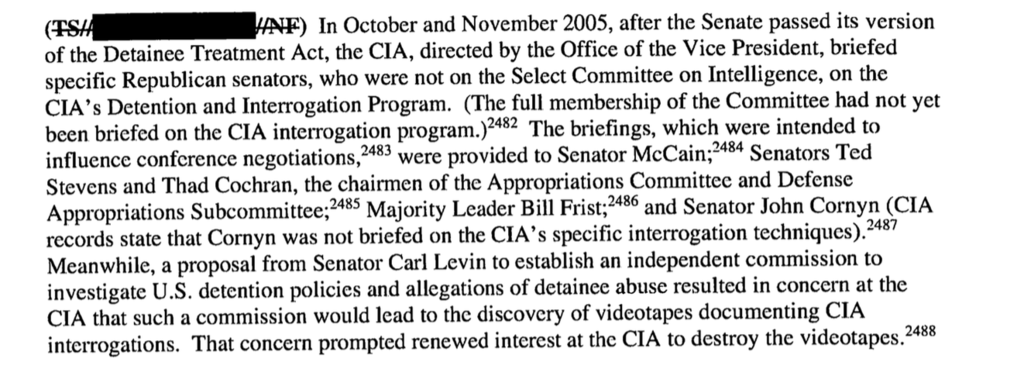

CIA used “rectal feeding” as part of torture program.
In one of the most disturbing revelations in the newly released Senate report on the CIA's "enhanced interrogation" program, the CIA is found to have used "rectal feeding" and rectal rehydration to impose their will on detainees.

Full story here.
Republicans on the Senate Intelligence Committee release scathing rebuttal.
In their minority release, Saxby Chambliss, joined by Marco Rubio, Jim Risch, Richard Burr, Tom Coburn, and Dan Coats, wrote that the report's conclusions "attack the CIA's integrity and credibility in developing and implementing the Program."
"Absent the support of the documentary record, and on the basis of a flawed analytical methodology, these problematic claims and conclusions create the false impression that the CIA was actively misleading policy makers and impeding the counterterrorism efforts of other federal government agencies during the Program's operation."
The Republicans claim that the committee made the decision to not "interview key witnesses" and that "led to significant analytical and factual errors in the original and subsequent updated versions of the study."
Read the full Republican Rebuttal
Report finds evidence that detainees were denied methods to dispose of their human waste, contradicting testimony given by then CIA Director Michael Hayden.

Over the past several decades, and especially since the terrible tragedy of 9/11, the CIA has been at the forefront of our Nation's campaign against al-Qa'ida and other terrorist organizations worldwide. The women and men of the CIA have operated around the globe, 24-hours-a-day, working with their U.S. colleagues as well as with foreign partners to prevent terrorist attacks. As a result of these efforts, including the many sacrifices made by CIA officers and their families, countless lives have been saved and our Homeland is more secure.As part of the CIA's global effort to dismantle al-Qa'ida and to prevent future terrorist attacks, the Agency was directed by President Bush six days after 9/11 to carry out a program to detain terrorist suspects around the world. Certain detainees were subjected to enhanced interrogation techniques (EITs), which the Department of Justice determined at the time to be lawful and which were duly authorized by the Bush Administration. These techniques, which were last used by the CIA in December 2007, subsequently were prohibited by an Executive Order issued by President Obama when he took office in January 2009.Today, the Senate Select Committee on Intelligence (SSCI) released a redacted version of the Executive Summary, Findings, and Conclusions of its Study on CIA's former detention and interrogation program, along with Minority Views and the Additional Views of a number of Committee members on the same subject. The CIA has also released its redacted June 2013 response to the Study, which is being posted on our website, www.cia.gov.As noted in CIA's response to the study, we acknowledge that the detention and interrogation program had shortcomings and that the Agency made mistakes. The most serious problems occurred early on and stemmed from the fact that the Agency was unprepared and lacked the core competencies required to carry out an unprecedented, worldwide program of detaining and interrogating suspected al-Qa'ida and affiliated terrorists. In carrying out that program, we did not always live up to the high standards that we set for ourselves and that the American people expect of us. As an Agency, we have learned from these mistakes, which is why my predecessors and I have implemented various remedial measures over the years to address institutional deficiencies.Yet, despite common ground with some of the findings of the Committee's Study, we part ways with the Committee on some key points. Our review indicates that interrogations of detainees on whom EITs were used did produce intelligence that helped thwart attack plans, capture terrorists, and save lives. The intelligence gained from the program was critical to our understanding of al-Qa'ida and continues to inform our counterterrorism efforts to this day.We also disagree with the Study's characterization of how CIA briefed the program to the Congress, various entities within the Executive Branch, and the public. While we made mistakes, the record does not support the Study's inference that the Agency systematically and intentionally misled each of these audiences on the effectiveness of the program. Moreover, the process undertaken by the Committee when investigating the program provided an incomplete and selective picture of what occurred. As noted in the Minority views and in a number of additional views of Members, no interviews were conducted of any CIA officers involved in the program, which would have provided Members with valuable context and perspective surrounding these events.Throughout its 67-year history, CIA has played a critical role keeping our Nation secure, and CIA officers are rightly proud and honored to be part of an organization that is indispensable to our national security. The numerous challenges on the world stage demand the full attention, focus, and capabilities of the women and men of the CIA so that our country can stay strong and our fellow Americans remain safe. To be successful, the CIA needs to work closely with its Congressional oversight committees as we confront these challenges. With today's release of Committee documents and the CIA response, we look forward to the way ahead.
Report finds CIA leadership vetoed disciplinary action for an official involved in the death of a detainee.

Throughout our history, the United States of America has done more than any other nation to stand up for freedom, democracy, and the inherent dignity and human rights of people around the world. As Americans, we owe a profound debt of gratitude to our fellow citizens who serve to keep us safe, among them the dedicated men and women of our intelligence community, including the Central Intelligence Agency. Since the horrific attacks of 9/11, these public servants have worked tirelessly to devastate core al Qaeda, deliver justice to Osama bin Laden, disrupt terrorist operations and thwart terrorist attacks. Solemn rows of stars on the Memorial Wall at the CIA honor those who have given their lives to protect ours. Our intelligence professionals are patriots, and we are safer because of their heroic service and sacrifices.In the years after 9/11, with legitimate fears of further attacks and with the responsibility to prevent more catastrophic loss of life, the previous administration faced agonizing choices about how to pursue al Qaeda and prevent additional terrorist attacks against our country. As I have said before, our nation did many things right in those difficult years. At the same time, some of the actions that were taken were contrary to our values. That is why I unequivocally banned torture when I took office, because one of our most effective tools in fighting terrorism and keeping Americans safe is staying true to our ideals at home and abroad.Today's report by the Senate Select Committee on Intelligence details one element of our nation's response to 9/11—the CIA's detention and interrogation program, which I formally ended on one of my first days in office. The report documents a troubling program involving enhanced interrogation techniques on terrorism suspects in secret facilities outside the United States, and it reinforces my long-held view that these harsh methods were not only inconsistent with our values as nation, they did not serve our broader counterterrorism efforts or our national security interests. Moreover, these techniques did significant damage to America's standing in the world and made it harder to pursue our interests with allies and partners. That is why I will continue to use my authority as President to make sure we never resort to those methods again.As Commander in Chief, I have no greater responsibility than the safety and security of the American people. We will therefore continue to be relentless in our fight against al Qaeda, its affiliates and other violent extremists. We will rely on all elements of our national power, including the power and example of our founding ideals. That is why I have consistently supported the declassification of today's report. No nation is perfect. But one of the strengths that makes America exceptional is our willingness to openly confront our past, face our imperfections, make changes and do better. Rather than another reason to refight old arguments, I hope that today's report can help us leave these techniques where they belong—in the past. Today is also a reminder that upholding the values we profess doesn't make us weaker, it makes us stronger and that the United States of America will remain the greatest force for freedom and human dignity that the world has ever known.
Report finds CIA paid foreign officials cash to cooperate with secret detention programs.
From the report:
To encourage governments to clandestinely host CIA detention sites, or to increase support for existing sites, the CIA provided millions of dollars in cash payments to foreign government officials.
As we have both stated before, we are opposed to this study and believe it will present serious consequences for U.S. national security. Regardless of what one's opinions may be on these issues, the study by Senate Democrats is an ideologically motivated and distorted recounting of historical events. The fact that the CIA's Detention and Interrogation program developed significant intelligence that helped us identify and capture important al-Qa'ida terrorists, disrupt their ongoing plotting, and take down Usama Bin Ladin is incontrovertible. Claims included in this report that assert the contrary are simply wrong.
No foreign countries are identified in the report.
The study does not identify any foreign countries that hosted CIA detention sites, according to a FAQ supplied alongside the main report.
The study's authors intended to refer overseas countries by pseudonyms. This would have allowed connections to be made between the same cases. However, the Obama administration objected.
According to the FAQ: "The countries were originally identified in the Study by a letter (for example, "Country J"). The administration has since redacted these letter designations in the public version so the countries are shown as "Country __.""
Full story here.
Senate Intelligence Committee report concludes the CIA misled policymakers and the public, "enhanced interrogation techniques” were not effective.
The Senate Intelligence Committee made 20 findings and conclusions, with four central themes, according to a press release from Sen. Feinstein's office.
Sen. Feinstein said some of the CIA's activities amounted to torture.
"This document examines the CIA's secret overseas detention of at least 119 individuals and the use of coercive interrogation techniques—in some cases amounting to torture," Feinstein said.
From the release:
Key findingsThe study's 20 findings and conclusions can be grouped into four central themes, each of which is supported extensively in the Executive Summary: 1.The CIA's "enhanced interrogation techniques" were not effective.2.The CIA provided extensive inaccurate information about the operation of the program and its effectiveness to policymakers and the public. 3.The CIA's management of the program was inadequate and deeply flawed.4.The CIA program was far more brutal than the CIA represented to policymakers and the American public.
The Democrats on the Senate Intelligence Committee will release their long-delayed declassified report today on CIA detention and interrogation policies in the years following September 11, 2001.
The report, which cost upwards of $40 million to produce, will reportedly conclude that the CIA mishandled it's highly controversial detention and interrogation program. The Republican members of the committee are expected to release their dissent of the report.
Committee Chair Sen. Dianne Feinstein will take to the Senate Floor at 11 a.m. to provide details on the report.











